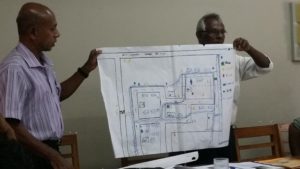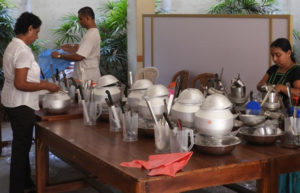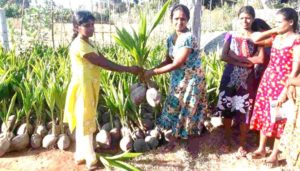The Anglican Church in Sri Lanka has been engaging in disaster preparedness training to help communities respond to the increasing natural disasters affecting the country. In many dioceses this has lead to a deep connection with local communities and the desire to broaden community empowerment and development in other areas.
Janice Proud, Anglican Alliance relief manager, recently attended a workshop in Sri Lanka to see how the National Christian Council (NCC) of Sri Lanka are using the Anglican Church’s training to enable faith communities to reduce the impact of disasters and respond effectively when they happen.
Background
Coastal regions of Sri Lanka were devastated by the Indian Ocean tsunami in December 2004, with waves up to twelve metres high, leading to high death toll, casualties, destruction of 90,000 homes as well as community buildings and loss of livelihoods.
After the initial recovery work, the Diocese of Colombo set up a think tank on disaster management and disaster risk reduction, to learn from the experience and plan for the future. In May 2017 the country was devastated by torrential rains, mud slides and flash flooding in 15 districts. This time the church was ready to respond effectively and efficiently, with a new asset-based and community-driven approach.
 After the tsunami response, the Diocese of Colombo trained people over two years, with technical support from Church’s Auxiliary for Social Action (CASA) in India and support from Episcopal Relief & Development. The training was very practical and enabled people to use their experience in their communities between training modules. Participants also shared their experience with a team of Anglicans who were developing a disaster preparedness resource, Pastors and Disasters, which was published on International Disaster Preparedness Day in October 2014.
After the tsunami response, the Diocese of Colombo trained people over two years, with technical support from Church’s Auxiliary for Social Action (CASA) in India and support from Episcopal Relief & Development. The training was very practical and enabled people to use their experience in their communities between training modules. Participants also shared their experience with a team of Anglicans who were developing a disaster preparedness resource, Pastors and Disasters, which was published on International Disaster Preparedness Day in October 2014.
From Disaster Preparedness and Response…
The subsequent training of teams from around the Diocese of Colombo in disaster preparedness and response had a huge impact on how the church and communities responded to flooding, landslides and other emergencies. They were more efficient and effective, and worked with national and local government to implement their response. The community work is led by clergy and lay volunteers.
This improved response was noticed by the NCC, who approached the diocese requesting training for ecumenical teams around the whole country. DRR is a new area for the church and it was important to ensure good engagement to ensure sustainability.
The archdeacon in the Diocese of Kurunegala said, “Initially participants thought it was just another training, but after the field experience, mapping and assessments, they learnt the importance of working with communities and preparedness. They were transformed.”
On a recent visit to the Diocese of Colombo, Janice Proud, Anglican Alliance Relief Manager, and a group of Anglicans from around the Anglican Communion, were able to join a workshop for the NCC teams.
Janice said, “Teams had been working in their communities to prepare risk maps. It was interesting to hear how the risks varied around the country: flooding and landslides around the central mountains, drought in the northern areas, damage to crops and homes by elephants in drought areas, chronic kidney disease due to arsenic and cadmium poisoning from intensive agriculture, water pollution. They also shared how the communities are planning to mitigate the risks they had identified, for instance where water is heavily polluted from pig keeping, they plan a biogas unit which will clear up the water and improve air quality from the stagnant water, as well as providing gas for cooking and compost to improve crop production.”
 When the Anglican group later visited Kandy, Binnu Jeevarajan, coordinator for the Board of Social Responsibility of the Diocese of Colombo, shared how the response to floods and landslides in May 2017 had used local assets identified during the training and subsequent community work.
When the Anglican group later visited Kandy, Binnu Jeevarajan, coordinator for the Board of Social Responsibility of the Diocese of Colombo, shared how the response to floods and landslides in May 2017 had used local assets identified during the training and subsequent community work.
He shared how congregation members in Colombo helped assemble 500 kitchen packs per day (pictured, right), while young people from St Thomas’ College, Colombo, an Anglican school helped load trucks at night to take relief supplies to the affected areas once roads have been cleared, and others helped clean the mud out of homes once the water subsided.
“This time, all the immediate response was from local church resources,” said Nagulan Nesiah, Senior Disaster Response and Risk Reduction Programme Officer for Episcopal Relief & Development, “Outside support came later for the recovery and rehabilitation work.”
Binnu Jeevarajan explain that the curriculum, which is church-based, does not aim to prepare groups to respond to all the needs, but coordinate with others and fill the gaps. Local committees meet monthly to take forward their action plan. He shared how he continues to encourage groups to look to their own resources to implement their action plans.
For example, the Jaffna committee identified tree planting as their top priority in their drought affected area. When they requested support from the diocese, Binnu urged them to look at local resources. They met with the local Agriculture Department, hoping to order coconut plants and request a discount. The Agriculture Department were so amazed that the Church was working on this that they gave them 1,000 coconut plants free (pictured below, left), the church just had to arrange transport.
The Jaffna committee have since returned for mango plants, which they bought at a discount with support from other churches, to regenerate a deforested area and generate income.
In Anuradhapura, the assessments highlighted the drought situation and the problem of arsenic contamination of drinking water, which causes chronic kidney problems. The diocese was able to provide immediate support with 5 litre water bottles, left over from the flood relief, to the most needy.
 The Anuradhapura committee got connected to the Church of Ceylon youth movement, who shared their assets. The committee was pleased to have support from the youth movement for the purchase and distribution of water storage barrels in the water contaminated and drought affected area. The committee has now developed a proposal for water filtration that would provide safe drinking water for a small charge, to allow regular maintenance of the filter. This highlights both the networking and assets based approach of the Church of Ceylon’s disaster preparedness and response work.
The Anuradhapura committee got connected to the Church of Ceylon youth movement, who shared their assets. The committee was pleased to have support from the youth movement for the purchase and distribution of water storage barrels in the water contaminated and drought affected area. The committee has now developed a proposal for water filtration that would provide safe drinking water for a small charge, to allow regular maintenance of the filter. This highlights both the networking and assets based approach of the Church of Ceylon’s disaster preparedness and response work.
…to Sustainable Community Empowerment
In other areas committees are also engaging deeply with their communities. They are finding that they are identifying other issues in the communities that they feel they want to be engaging with, such as health, education, migration from rural areas, and plantation workers rights. The Diocese of Colombo is finding that the committees are needing support not just for Disaster Preparedness and Response but for Sustainable Community Empowerment.
 “It is amazing to hear of Sustainable Community Empowerment growing out of Disaster Preparedness and Response,” said Janice Proud. “In other places such as Zimbabwe, we are trying to include Disaster Preparedness and Response into Church Community Mobilisation. It is so exciting to see God at work in these committees and communities, that sustainable community empowerment is coming out of the strong disaster preparedness and response work that the churches have embedded in their communities. Even more impressive is that this is happening in a multi faith context and moving way beyond the churches.”
“It is amazing to hear of Sustainable Community Empowerment growing out of Disaster Preparedness and Response,” said Janice Proud. “In other places such as Zimbabwe, we are trying to include Disaster Preparedness and Response into Church Community Mobilisation. It is so exciting to see God at work in these committees and communities, that sustainable community empowerment is coming out of the strong disaster preparedness and response work that the churches have embedded in their communities. Even more impressive is that this is happening in a multi faith context and moving way beyond the churches.”
The Anglican Alliance is delighted to be able to share the work that the Diocese of Colombo initiated in Sri Lanka, as it shows the real benefits of the Church engaging in disaster preparedness and response. This work decreases the impact of natural disasters on communities, both by mitigating the risks locally and by increasing the broader capacity to come together and respond once a disaster has struck. Hearing about the close working together of churches, temples, government and others during the floods and landslides in May 2017 showed disaster preparedness and response at its best.
Helping local churches to prepare for and respond well to disaster is a priority for the Anglican Alliance. The Pastors and Disasters toolkit is a great resource to help communities engage in this work. However, sometimes hearing how others have done this, the challenges and the benefits can help others to take the first step to engage with this process. This was clearly seen in Sri Lanka, as the National Christian Council requested training having seen the work and impact of the disaster preparedness and response training by the Diocese of Colombo.
Prayer
Let us pray for the Diocese of Colombo Ceylon as it continues to support the Disaster Preparedness and Response work of the committees in the different regions of Sri Lanka.
Let us pray for wisdom and support for the Diocese of Colombo for taking this work forward to Sustainable Community Empowerment
Let us pray for communities around the world affected by natural and man-made disasters at this time, for strength and perseverance, for protection particularly for the most vulnerable, for peace.
Links
Read more about the flood response in Sri Lanka earlier this year:
Update from the Diocese of Colombo – 10 June 2017
Update from the Diocese of Colombo – 9 June 2017
Access the Pastors and Disasters toolkit
Photos
1: Disaster preparedness and response team sharing the map of their community which is affected by water pollution from pig keeping, © Anglican Alliance
2: Packing cooking utensils at Church compound in Colombo, May 2017, © Diocese of Colombo
3: Youth from Diocese of Ceylon distributing water storage barrels to vulnerable households with Anuradhapura committee, © Diocese of Colombo
4: Coconut plants ready for planting, Jaffna, © Diocese of Colombo

